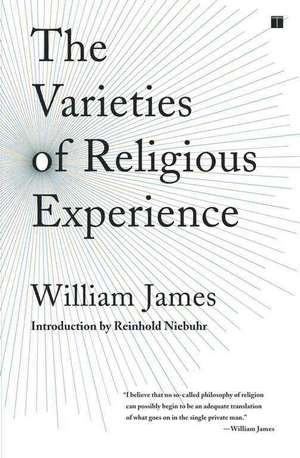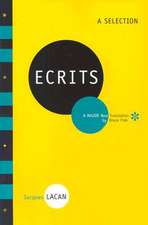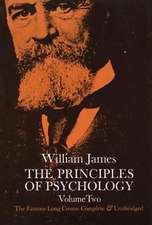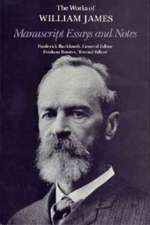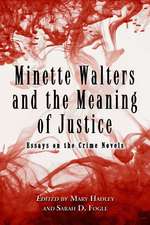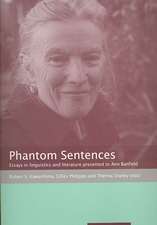The Varieties of Religious Experience: A Study in Human Nature
Autor William James Reinhold Niebuhren Limba Engleză Paperback – 30 apr 2004
"The problem I have set myself is a hard one: first, to defend...'experience' against 'philosophy' as being the real backbone of the world's religious life...and second, to make the hearer or reader believe what I myself invincibly do believe, that, although all the special manifestations of religion may have been absurd (I mean its creeds and theories), yet the life of it as a whole is mankind's most important function."Drawing evidence from his own experience and from such diverse thinkers as Voltaire, Whitman, Emerson, Luther, Tolstoy, John Bunyan, and Jonathan Edwards, The Varieties of Religious Experience remains one of the most influential books ever written on the psychology of religion.
The culmination of William James' interest in the psychology of religion, The Varieties of Religious Experience approached the study of religious phenomena in a new way -- through pragmatism and experimental psychology. The most important effect of the publication of the Varieties was to shift the emphasis in this field of study from the dogmas and external forms of religion to the unique mental states associated with it. Explaining the book's intentions in a letter to a friend, James stated:
"The problem I have set myself is a hard one: first, to defend...'experience' against 'philosophy' as being the real backbone of the world's religious life...and second, to make the hearer or reader believe what I myself invincibly do believe, that, although all the special manifestations of religion may have been absurd (I mean its creeds and theories), yet the life of it as a whole is mankind's most important function."Drawing evidence from his own experience and from such diverse thinkers as Voltaire, Whitman, Emerson, Luther, Tolstoy, John Bunyan, and Jonathan Edwards, The Varieties of Religious Experience remains one of the most influential books ever written on the psychology of religion.
Preț: 102.47 lei
Nou
Puncte Express: 154
Preț estimativ în valută:
19.61€ • 20.97$ • 16.35£
19.61€ • 20.97$ • 16.35£
Carte disponibilă
Livrare economică 27 martie-10 aprilie
Preluare comenzi: 021 569.72.76
Specificații
ISBN-13: 9780743257879
ISBN-10: 0743257871
Pagini: 398
Dimensiuni: 142 x 212 x 30 mm
Greutate: 0.38 kg
Ediția:Touchstone.
Editura: Touchstone Books
ISBN-10: 0743257871
Pagini: 398
Dimensiuni: 142 x 212 x 30 mm
Greutate: 0.38 kg
Ediția:Touchstone.
Editura: Touchstone Books
Notă biografică
William James was the first educator in the United States to offer a psychology course. An American philosopher, historian, and psychologist, James is widely known forThe Principles of Psychology(1890) as well as many essays on the science of religion.
Cuprins
Contents
Introduction
Author's Preface
1 Religion and Neurology
Introduction: the course is not anthropological, but deals with personal documents -- Questions of fact and questions of value -- In point of fact, the religious are often neurotic -- Criticism of medical materialism, which condemns religion on that account -- Theory that religion has a sexual origin refuted -- All states of mind are neurally conditioned -- Their significance must be tested not by their origin but by the value of their fruits -- Three criteria of value; origin useless as a criterion -- Advantages of the psychopathic temperament when a superior intellect goes with it -- especially for the religious life.
2 Circumscription of the Topic
Futility of simple definitions of religion -- No one specific "religious sentiment" -- Institutional and personal religion -- We confine ourselves to the personal branch -- Definition of religion for the purpose of these lectures -- Meaning of the term "divine" -- The divine is what prompts solemn reactions -- Impossible to make our definitions sharp -- We must study the more extreme cases -- Two ways of accepting the universe -- Religion is more enthusiastic than philosophy -- Its characteristic is enthusiasm in solemn emotion -- Its ability to overcome unhappiness -- Need of such a faculty from the biological point of view.
3 The Reality of the Unseen
Percepts versus abstract concepts -- Influence of the latter on belief -- Kant's theological Ideas -- We have a sense of reality other than that given by the special senses -- Examples of "sense of presence" -- The feeling of unreality -- Sense of a divine presence: examples -- Mystical experiences: examples -- Other cases of sense of God's presence -- Convincingness of unreasoned experience -- Inferiority of rationalism in establishing belief -- Either enthusiasm or solemnity may preponderate in the religious attitude of individuals.
4 and 5 The Religion of Healthy-Mindedness
Happiness is man's chief concern -- "Once-born" and "twice-born" characters -- Walt Whitman -- Mixed nature of Greek feeling -- Systematic healthy-mindedness -- Its reasonableness -- Liberal Christianity shows it -- Optimism as encouraged by Popular Science -- The "Mind-cure" movement -- Its creed -- Cases -- Its doctrine of evil -- Its analogy to Lutheran theology -- Salvation by relaxation -- Its methods: suggestion -- meditation -- "recollection" -- verification -- Diversity of possible schemes of adaptation to the universe -- Appendix: Two mind-cure cases.
6 and 7 The Sick Soul
Healthy-mindedness and repentance -- Essential pluralism of the healthy-minded philosophy -- Morbid-mindedness: its two degrees -- The pain-threshold varies in individuals -- Insecurity of natural goods -- Failure, or vain success of every life -- Pessimism of all pure naturalism -- Hopelessness of Greek and Roman view -- Pathological unhappiness -- "Anhedonia" -- Querulous melancholy -- Vital zest is a pure gift -- Loss of it makes physical world look different -- Tolstoy -- Bunyan -- Alline -- Morbid fear -- Such cases need a supernatural religion for relief -- Antagonism of healthy-mindedness and morbidness -- The problem of evil cannot be escaped.
8 The Divided Self, and the Process of Its Unification
Heterogeneous personality -- Character gradually attains unity -- Examples of divided self -- The unity attained need not be religious -- "Counter conversion" cases -- Other cases -- Gradual and sudden unification -- Tolstoy's recovery -- Bunyan's.
9 Conversion
Case of Stephen Bradley -- The psychology of character-changes -- Emotional excitements make new centres of personal energy -- Schematic ways of representing this -- Starbuck likens conversion to normal moral ripening -- Leuba's ideas -- Seemingly unconvertible persons -- Two types of conversion -- Subconscious incubation of motives -- Self-surrender -- Its importance in religious history -- Cases.
10 Conversion -- Concluded
Cases of sudden conversion -- Is suddenness essential? -- No, it depends on psychological idiosyncrasy -- Proved existence of transmarginal, or subliminal, consciousness -- "Automatisms" -- Instantaneous conversions seem due to the possession of an active subconscious self by the subject -- The value of conversion depends not on the process, but on the fruits -- These are not superior in sudden conversion -- Professor Coe's views -- Sanctification as a result -- Our psychological account does not exclude direct presence of the Deity -- Sense of higher control -- Relations of the emotional "faith-state" to intellectual beliefs -- Leuba quoted -- Characteristics of the faith-state: sense of truth; the world appears new -- Sensory and motor automatisms -- Permanency of conversions.
11, 12, and 13 Saintliness
Sainte-Beuve on the State of Grace -- Types of character as due to the balance of impulses and inhibitions -- Sovereign excitements -- Irascibility -- Effects of higher excitement in general -- The saintly life is ruled by spiritual excitement -- This may annul sensual impulses permanently -- Probable subconscious influences involved -- Mechanical scheme for representing permanent alteration in character -- Characteristics of saintliness -- Sense of reality of a higher power -- Peace of mind, charity -- Equanimity, fortitude, etc. -- Connection of this with relaxation -- Purity of life -- Asceticism -- Obedience -- Poverty -- The sentiments of democracy and of humanity -- General effects of higher excitements.
14 and 15 The Value of Saintliness
It must be tested by the human value of its fruits -- The reality of the God must, however, also be judged -- "Unfit" religions get eliminated by "experience" -- Empiricism is not skepticism -- Individual and tribal religion -- Loneliness of religious originators -- Corruption follows success -- Extravagances -- Excessive devoutness, as fanaticism -- As theopathic absorption -- Excessive purity -- Excessive charity -- The perfect man is adapted only to the perfect environment -- Saints are leavens -- Excesses of asceticism -- Asceticism symbolically stands for the heroic life -- Militarism and voluntary poverty as possible equivalents -- Pros and cons of the saintly character -- Saints versus "strong" men -- Their social function must be considered -- Abstractly the saint is the highest type, but in the present environment it may fail, so we make ourselves saints at our peril -- The question of theological truth.
16 and 17 Mysticism
Mysticism defined -- Four marks of mystic states -- They form a distinct region of consciousness -- Examples of their lower grades -- Mysticism and alcohol -- "The anæsthetic revelation" -- Religious mysticism -- Aspects of Nature -- Consciousness of God -- "Cosmic consciousness" -- Yoga -- Buddhistic mysticism -- Sufism -- Christian mystics -- Their sense of revelation -- Tonic effects of mystic states -- They describe by negatives -- Sense of union with the Absolute -- Mysticism and music -- Three conclusions -- (1) Mystical states carry authority for him who has them -- (2) But for no one else -- (3) Nevertheless, they break down the exclusive authority of rationalistic states -- They strengthen monistic and optimistic hypotheses.
18 Philosophy
Primacy of feeling in religion, philosophy being a secondary function -- Intellectualism professes to escape subjective standards in her theological constructions -- "Dogmatic theology" -- Criticism of its account of God's attributes -- "Pragmatism" as a test of the value of conceptions -- God's metaphysical attributes have no practical significance -- His moral attributes are proved by bad arguments; collapse of systematic theology -- Does transcendental idealism fare better? Its principles -- Quotations from John Caird -- They are good as restatements of religious experience, but uncoercive as reasoned proof -- What philosophy can do for religion by transforming herself into "science of religions."
19 Other Characteristics
Aesthetic elements in religion -- Contrast of Catholicism and Protestantism -- Sacrifice and Confession -- Prayer -- Religion holds that spiritual work is really effected in prayer -- Three degrees of opinion as to what is effected -- First degree -- Second degree -- Third degree -- Automatisms, their frequency among religious leaders -- Jewish cases -- Mohammed -- Joseph Smith -- Religion and the subconscious region in general.
20 Conclusions
Summary of religious characteristics -- Men's religions need not be identical -- "The science of religions" can only suggest, not proclaim, a religious creed -- Is religion a "survival" of primitive thought? -- Modern science rules out the concept of personality -- Anthropomorphism and belief in the personal characterized pre-scientific thought -- Personal forces are real, in spite of this -- Scientific objects are abstractions, only individualized experiences are concrete -- Religion holds by the concrete -- Primarily religion is a biological reaction -- Its simplest terms are an uneasiness and a deliverance; description of the deliverance -- Question of the reality of the higher power -- The author's hypotheses: 1. The subconscious self as intermediating between nature and the higher region -- 2. The higher region, or "God" -- 3. He produces real effects in nature.
Postscript
Philosophic position of the present work defined as piece-meal supernaturalism -- Criticism of universalistic supernaturalism -- Different principles must occasion differences in fact -- What differences in fact can God's existence occasion? -- The question of immortality -- Question of God's uniqueness and infinity: religious experience does not settle this question in the affirmative -- The pluralistic hypothesis is more conformed to common sense.
Index
Descriere
Descriere de la o altă ediție sau format:
'By their fruits ye shall know them, not by their roots.'The Varieties of Religious Experience (1902) is William James's classic survey of religious belief in its most personal, and often its most heterodox, aspects. Asking questions such as how we define evil to ourselves, the difference between a healthy and a divided mind, the value of saintly behaviour, and what animates and characterizes the mental landscape of sudden conversion, James's masterpiece stands at a unique moment in the relationship between belief and culture. Faith in institutional religion and dogmatic theology was fading away, and the search for an authentic religion rooted in personality and subjectivity was a project conducted as an urgent necessity. With psychological insight, philosophical rigour, and a determination not to jump to the conclusion that in tracing religion's mental causes we necessarily diminish its truth or value, in the Varieties James wrote a truly foundational text for modern belief.Matthew Bradley's wide-ranging new edition examines the ideas that continue to fuel modern debates on atheism and faith. ABOUT THE SERIES: For over 100 years Oxford World's Classics has made available the widest range of literature from around the globe. Each affordable volume reflects Oxford's commitment to scholarship, providing the most accurate text plus a wealth of other valuable features, including expert introductions by leading authorities, helpful notes to clarify the text, up-to-date bibliographies for further study, and much more.
'By their fruits ye shall know them, not by their roots.'The Varieties of Religious Experience (1902) is William James's classic survey of religious belief in its most personal, and often its most heterodox, aspects. Asking questions such as how we define evil to ourselves, the difference between a healthy and a divided mind, the value of saintly behaviour, and what animates and characterizes the mental landscape of sudden conversion, James's masterpiece stands at a unique moment in the relationship between belief and culture. Faith in institutional religion and dogmatic theology was fading away, and the search for an authentic religion rooted in personality and subjectivity was a project conducted as an urgent necessity. With psychological insight, philosophical rigour, and a determination not to jump to the conclusion that in tracing religion's mental causes we necessarily diminish its truth or value, in the Varieties James wrote a truly foundational text for modern belief.Matthew Bradley's wide-ranging new edition examines the ideas that continue to fuel modern debates on atheism and faith. ABOUT THE SERIES: For over 100 years Oxford World's Classics has made available the widest range of literature from around the globe. Each affordable volume reflects Oxford's commitment to scholarship, providing the most accurate text plus a wealth of other valuable features, including expert introductions by leading authorities, helpful notes to clarify the text, up-to-date bibliographies for further study, and much more.
Recenzii
One of the seminal works of philosophy and theology.
